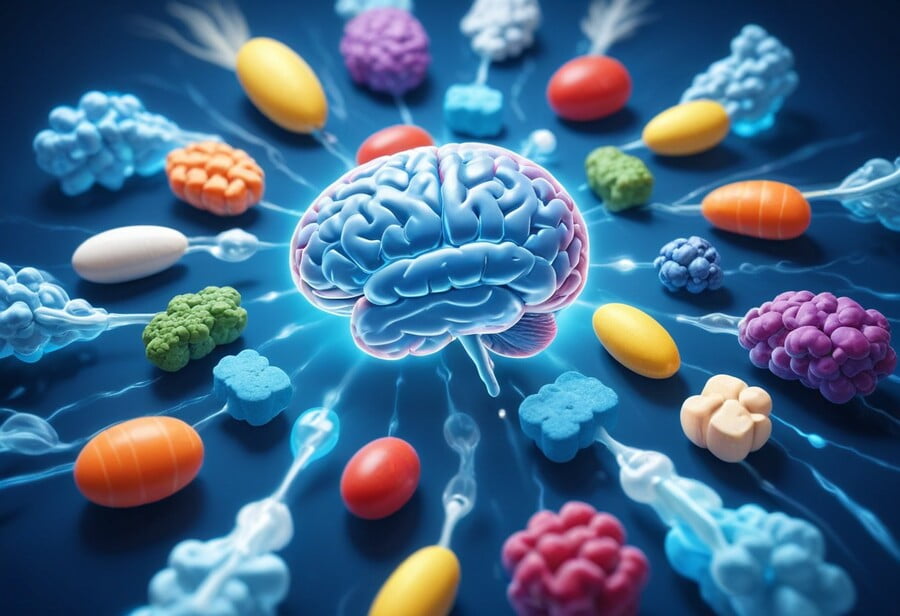Enhancing brain health: A comprehensive guide to vitamins and supplements
Do you ever struggle to keep mental sharpness? Whether you’re a student preparing for exams, a busy adult juggling job and family, or simply concerned about cognitive clarity as you age, you’re not alone. The good news is that you can take proactive measures to nourish and promote your brain’s performance. This guide goes deeply into the world of vitamins and supplements for optimal brain health, allowing you to make informed decisions about your cognitive health.
Unlocking the potential of vitamins for brain health
Vitamins are essential for sustaining a healthy brain. Consider B complex vitamins (B6, B12, and folic acid) to be the foundation of neurotransmitter production, which is essential for smooth communication between brain cells. Without enough of these vitamins, cognitive deterioration can set in. Meanwhile, vitamin D promotes brain cell proliferation, which may reduce the incidence of dementia. And don’t forget about vitamin E, the brain’s protective shield against oxidative damage, which keeps our cognitive skills sharp.
Fast-tracking brain repair: Vitamins and cognitive recovery
While vitamins cannot immediately “repair” the brain, evidence suggests they may aid in healing after injury or stress. Vitamin B12 deficiency, for example, is linked to nerve injury, and supplementation may be necessary for recovery. B12 injections have been proven in studies to increase nerve conduction velocity and overall nervous system function in those with deficits.
Further research is being conducted to investigate the possible effects of other vitamins in promoting brain repair. Investigations are underway to determine the effect of high-dose vitamin C on brain recovery after stroke, indicating an increasing acknowledgment of vitamins’ significance in post-injury brain repair.
Clearing mental fog: Vitamins for memory and mental clarity
Are you struggling with forgetfulness or mental fog? Certain vitamins can be helpful. Again, B vitamins are in the spotlight, with research indicating that they may improve memory and cognitive performance. A study published in the American Journal of Clinical Nutrition found that B vitamin supplementation significantly improved verbal memory and cognitive performance in older persons with mild cognitive impairment.
Vitamin E’s antioxidant properties may also combat brain fog and enhance mental clarity. While research on vitamin E’s impact on cognitive function yields mixed results, some studies indicate its potential benefits for individuals with Alzheimer’s disease or mild cognitive impairment.
Dietary choices for a sharper mind
In addition to vitamins, include brain-boosting foods in your diet is vital.
Fatty Fish: Incorporate salmon, tuna, mackerel, and trout into your diet.
Berries: Enjoy blueberries, strawberries, raspberries, and blackberries.
Nuts and Seeds: Add almonds, walnuts, flaxseeds, and chia seeds to your meals.
Leafy green vegetables: Choose spinach, kale, broccoli, and Swiss chard.
Whole grains include oats, quinoa, brown rice, and whole wheat bread.
The truth about brain supplements: Distinguishing fact from fiction
Navigating the world of brain supplements can be challenging. Some may provide genuine benefits, but others lack scientific proof. Independent investigation and conversation with a healthcare practitioner are essential for distinguishing fact from fantasy. Look for supplements with ingredients supported by clinical studies, and avoid those with excessive claims or ambiguous labelling.
Here are some red flags to out for while choosing brain supplements:
- Promises of immediate fixes: Long-term brain health necessitates a comprehensive approach that includes a well-balanced diet and frequent exercise.
- Unrealistic claims: Avoid pills that promise substantial increases in IQ or memory overnight.
- Lack of scientific references: reputable supplement businesses back up their claims with research citations.
Memory-boosting beverages: Drinks for cognitive enhancement
Looking for a brain-boosting beverage? Green tea is a fantastic choice since it contains L-theanine, an amino acid recognized for its soothing and focus-boosting properties. L-theanine interacts with caffeine in green tea, boosting alertness without the jitteriness commonly associated with coffee.
Blueberry smoothies are another wise choice since blueberries contain antioxidants called anthocyanin, which may improve memory and cognitive function. Remember, however, that a balanced diet is essential—do not rely entirely on beverages for cognitive stimulation. Aim for a variety of brain-boosting foods, in addition to any potential memory-enhancing beverages.
Essential trio: The three most important vitamins
While all of the vitamins mentioned have a role, there is a strong case for vitamin B12, vitamin D, and omega-3 fatty acids being the best for brain health.
- Vitamin B12: Adequate intake is critical for maintaining healthy nerve function and cognitive ability.
- Vitamin D: Linked to cognitive decline, and with receptors found throughout the brain, maintaining appropriate levels is critical.
- Omega-3 fatty acids, which are present in fatty fish such as salmon and tuna, are essential for brain cell activity and growth.
Personal journey: Overcoming brain fog
Struggling with brain fog myself, I’ve implemented several strategies that have made a significant difference:
- Prioritized quality sleep (7-8 hours) with a soothing bedtime routine.
- Increased water intake to stay hydrated.
- Adopted a whole-food diet rich in brain-boosting nutrients like fruits, vegetables, fish, whole grains, and healthy fats.
- Incorporated regular exercise, including brisk walks, to enhance blood flow.
- Practiced relaxation techniques such as meditation and deep breathing to manage stress.
- Started targeted supplements (B complex, omega-3s) after consulting a healthcare professional.
Daily dosage: B vitamins for everyday brain health
Are you interested in taking vitamins B1, B6, and B12 on a daily basis? Most adults can safely take a daily B complex supplement that includes these vitamins. Water-soluble; any excess is removed through the urine. However, there are several exceptions.
Pregnant or breastfeeding women should consult their doctor for recommended dosages. Underlying health conditions or medication use may hinder absorption or interact with supplements. Always consult your doctor in such cases.
Daily B complex intake provides the following advantages:
- The advantages include increased cognitive function, mood regulation, energy levels, and a stronger neurological system.
- Remember, a balanced diet rich in B vitamins is ideal, but a daily B complex supplement can bridge nutritional gaps and offer additional support for optimal brain health. Consulting your doctor is key to determining the right dosage for your needs.
Mayo Clinic’s perspective: Recommendations for memory loss
Memory loss, whether it is a natural aspect of aging or an indication of an underlying medical disease, deserves attention. The Mayo Clinic recommends for a multimodal approach to addressing memory loss, which includes:
- A balanced diet high in fruits, vegetables, and whole grains
- Regular exercise can increase blood flow and cognitive function
- Engage in cognitive stimulation activities
- Prioritize quality sleep
- Use effective stress management techniques
- Maintaining social bonds
- Seeking medical examination for serious memory loss.
The Mayo Clinic recommends vitamin supplements for memory loss:
No “miracle” vitamin exists. But maintaining a balanced diet is essential for good brain function. Vitamin supplements may be prescribed by a doctor for deficiencies or specific medical concerns.
B12 vs. B complex: Selecting the appropriate supplement
When it comes to B12 and B complex pills, which should you take? Both provide benefits for brain health, although with different purposes:
- Vitamin B12: Improves nerve and cognitive function, making it especially useful for those with identified deficiencies.
- B Complex: Contains a wide spectrum of B vitamins, providing additional support for brain function.
Finally, your decision is determined by your personal demands and nutritional preferences. Consult your doctor to discover the best solution for you.
Nutrient-rich diet: Best vitamins and foods for brain health
Do you want to know which vitamins and nutrients are optimal for brain health? Consider including the following in your diet.
- B vitamins (B1, B6, and B12) are essential for neurotransmitter generation and cognitive function and can be found in leafy greens, whole grains, nuts, seeds, and animal products.
- Vitamin D: Promotes brain cell growth and may protect against cognitive decline; found in fatty fish, eggs, fortified meals, and sunlight.
- Vitamin E: An antioxidant that protects brain cells from harm; found in nuts, seeds, avocados, and olive oil.
Foods that improve your brainpower
- Fatty fish: High in omega-3 fatty acids, which promote cognitive function.
- Berries are high in antioxidants, which help to protect brain cells.
- Nuts and seeds: Rich in vitamin E and healthy fats.
- Leafy green vegetables: Provide folate and B vitamins, which aid in neurotransmitter formation.
- Whole grains provide sustained energy for brain function.
Fighting dementia: Supplements for cognitive support
While dementia has no cure, several nutrients may provide cognitive help. Ginkgo biloba and curcumin are two examples being studied for their ability to halt cognitive decline. However, they should be used in addition to, not instead of, conventional medical care. Before starting any new supplements, consult your doctor, especially if you have underlying medical conditions or take drugs.
Heart-brain connection: Nutrients for cardiovascular and cognitive health
The health of your heart and brain are inextricably linked. Both benefit from nutrients such as omega-3 fatty acids and antioxidants, as proper blood flow is required to provide oxygen and nutrition to the brain.
Opt for:
- Heart-healthy fats: Prefer unsaturated fats over saturated and trans fats.
- Fruits and vegetables: High in antioxidants and vitamins, which are essential for heart and brain health.
- Whole grains: Opt for sustained energy and essential nutrients.
Nervous system nourishment: Supplements for nerve health
Alpha-lipoic acid, a natural antioxidant, may improve nerve health, and B vitamins are essential for nervous system function. Consulting your doctor can help you assess whether nerve health supplements are right for your specific needs.
Always check with your doctor before starting any supplements, especially if you have pre-existing health conditions or take medications.
Top Picks: Best Brain Supplements for Cognitive Enhancement
What Are the Best Brain Supplements?
The world of brain supplements can be overwhelming. While some offer genuine benefits, others lack scientific backing. Here’s a look at some promising contenders, but remember:
- There’s no substitute for a healthy lifestyle: A balanced diet, regular exercise, quality sleep, and stress management are the cornerstones of cognitive health. Supplements should complement these habits, not replace them.
- Individual needs vary: What works for one person might not be effective for another. Consulting with a healthcare professional is crucial for personalized recommendations.
Here are some top contenders with potential cognitive benefits:
- Omega-3 fatty acids: Particularly DHA, these are essential for brain cell function, memory, and learning. Fatty fish and fish oil supplements are good sources.
- Lion’s mane mushroom: Studies suggest it may improve cognitive function and memory, especially in older adults. However, more research is needed.
- Curcumin: This compound found in turmeric has anti-inflammatory and antioxidant properties that may benefit brain health. Research on its cognitive effects is ongoing.
- Phosphatidylserine: A natural brain chemical that may support memory and cognitive function. Studies have yielded mixed results, and more research is needed.
Always discuss any potential supplements with your doctor before starting them, especially if you have pre-existing health conditions or take medications.
Holistic approach: Supplements for overall brain and body health
Numerous supplements can benefit both your brain and overall well-being:
- Omega-3 fatty acids: Supporting brain function and heart health.
- Coenzyme Q10 (CoQ10): Aiding cellular energy production throughout the body.
- Probiotics: Influencing gut health, potentially linked to brain function.
Remember, while supplements can complement a healthy lifestyle, they should not replace it. A balanced diet rich in fruits, vegetables, whole grains, and lean protein remains paramount.
The omega-3 advantage: Fatty acids for brain health
Do omega-3 fatty acids promote brain health? Yes, there is strong evidence supporting their involvement in brain function and cognitive wellness.
Omega-3s, especially DHA, are essential for:
- Brain cell growth and function.
- Cognitive function, which includes memory, learning, and focus.
- Mood modulation, which could help manage despair and anxiety.
Sources of Omega-3 Fatty Acids:
- Fatty fish include salmon, tuna, sardines, and mackerel.
- Fish oil supplements are a concentrated supply of omega-3s.
Brain-boosting veggies: Vegetables for cognitive enhancement
What foods promote healthy brain development? While all vegetables have health benefits, some excel at improving brain function.
- Leafy greens (spinach, kale) are abundant in folate, vitamin K, and B vitamins.
- Beet nitrates improve blood flow to the brain.
- Cruciferous veggies (such as broccoli and cauliflower): Choline is an essential vitamin for memory and learning.
- Bell peppers: High in vitamin C and flavonoids, which help protect brain cells.
Remember to diversify your vegetable intake to get a wide variety of brain-boosting nutrients.
By adopting these suggestions into your daily routine, you can take proactive steps to promote brain health and cognitive function. Remember that a well-balanced diet, exercise, sleep, stress management, and social engagement are essential for long-term brain health. Consult your healthcare practitioner to develop a plan that is suited to your unique requirements and maximizes your brain health journey.
Frequently asked questions
While no single vitamin reigns supreme, a combination of vitamin B12, vitamin D, and omega-3 fatty acids is crucial for optimal brain health.
Some show promise, such as those containing omega-3s, B vitamins, curcumin, or resveratrol. However, individual responses vary, and consulting a healthcare professional is advised before starting any supplements.
Green tea with L-theanine and blueberry smoothies packed with antioxidants may offer cognitive benefits, but a balanced diet remains key for optimal memory function.
For most adults, taking B1, B6, and B12 daily is generally safe, as excess amounts are excreted through urine. However, consult your doctor, especially if you’re pregnant, have underlying health conditions, or take medications.
Their recommendations include a balanced diet, regular exercise, cognitive stimulation, quality sleep, stress management, social connection, and medical evaluation for significant memory loss.
Choosing between B12 and B complex depends on your needs. B12 is ideal for diagnosed deficiencies, while B complex offers broader support for brain health.
Key vitamins include B vitamins, vitamin D, and vitamin E, found in a variety of brain-boosting foods like fatty fish, berries, nuts, seeds, leafy greens, and whole grains.
Ginkgo biloba and curcumin are under study, but they should complement conventional medical treatment. However, consult your doctor before starting any new supplements.
Yes, omega-3s, especially DHA, are essential for brain function and cognitive health.
Leafy greens, cruciferous vegetables, beets, bell peppers, and tomatoes are among the top choices for supporting optimal brain development and function.




